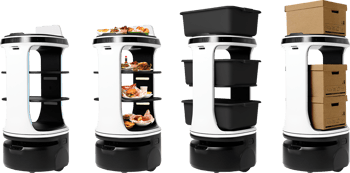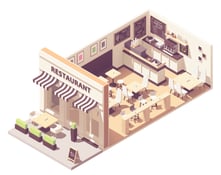In the restaurant industry, location is everything – so why settle for just one? Food trucks present an opportunity to manage a mobile restaurant that brings dishes directly to hungry customers.
The $1.8 billion industry has come a long way since the first hot dog carts and taco trucks began dotting the map. Today, you can find just about anything on a food truck menu and you can’t go many places without seeing one. They’ve even inspired TV series like Food Network’s The Great Food Truck Race.
Food Trucks vs. Food Halls
While food trucks offer mobility and flexibility, recent years have seen food halls emerge as a trendy alternative to both traditional brick and mortar locations and trucks. The total value of the food hall market is expected to grow by nearly $72 billion by 2026. That means food halls are far outpacing food trucks. If trucks are ubiquitous, food halls are becoming downright inescapable.
As a result, many food truck and traditional restaurant operators are interested in joining in on the trend and taking up residence in a food hall. Just don’t call these eateries “food courts.” Operators and enthusiasts are adamant about pointing out the key differences between the drab mall food courts of old and today’s bustling food halls.
While food courts tend to look the same, offering familiar selections of quick-service chains, no two food halls are alike. They offer unique and authentic flavors, local favorites, and the variety to satisfy diverse palates.
Meet Stephanie Swanz, an Expert in Food Trucks and Food Halls
To learn more about what it takes to run food trucks and thrive in food halls, we spoke to Stephanie Swanz about starting a food truck business, driving long-term success as a food truck operator, and transitioning to managing food halls.
Swanz began her food career as the owner of Tampa-based Empamamas, a food truck. After an award-winning run, she made the move to Armature Works, a food hall. The hall houses an Empamamas location and Swanz’s second restaurant, Muchachas.
7 Steps for Starting a Food Truck
- Research the local scene: Who says conducting research needs to mean burying your head in a book? Digging into the local scene should involve visiting events to observe food truck staffs in action. You’ll have plenty of time for taste tasting too as you get a sense of what’s on your competitors’ menus.
- Develop a concept and a business plan: In a crowded marketplace, only truly special food trucks will stand out. You can’t hope to drive consistent traffic without a unique concept for your menu. And don’t forget a business plan that takes into account your market research and outlines a road to success. Make sure to factor in your start-up expenses and ongoing costs.
- Rent or buy your truck: You’ll need a vehicle or two for starting a food truck business. Depending on your budget, you may opt to rent or buy, and to get a truck that’s already decked out with ready-to-go equipment or one that's an empty space. Purchasing your own truck will cost more upfront, but it will save you money in the long run and offer flexibility for customization.
- Obtain the necessary licenses and permits: Legally, starting a food truck business means following a range of federal, state, and local laws. Research the regulations affecting your truck and take the necessary steps to stay compliant. Don’t leave yourself vulnerable to fines and other penalties!
- Purchase your equipment and supplies: Once you’ve got your truck (or fleet), it’s time to equip it with all the gear you’ll need for preparing and serving food. In addition to standard appliances like fridges and fryers, this may include digital solutions for payments and for managing your inventory and team.
- Hire your staff: Even small restaurants require a team effort to run smoothly and satisfy diners. Devote the necessary attention to hiring and you’ll find a passionate team capable of contributing to a positive workplace culture.
- Learn and improve: Swanz suggests that the most important part of running a successful restaurant is developing policies and procedures to create best practices. As you learn on the job, apply the lessons you learn to ensure consistent results, efficient processes, and satisfied customers. Speaking of customers, keeping track of their feedback will help you adjust your strategy for long-term success.
The Benefits and Challenges of Starting a Food Truck Business
For Swanz, starting a food truck seemed like a natural way to employ her sales skills without putting a ceiling on her earnings. Swanz says, “My goal with the food truck was to take my name and product to people and not wait for people to come to me.” She explains that the main benefit of this approach has been “choosing where I want to go.”
That said, “The food truck life isn’t for the faint of heart,” Swanz warns. As she explains, managing a food truck means “loading up what’s potentially a 20,000 pound kitchen and driving it to different locations.” Before her first event, Swanz spent an entire night rolling more than 600 empanadas by hand. It led her to wonder, “Will it always be like this?”
Managing a food truck is always like that. Three or four hours in a food truck, Swanz points out, is much harder work than pulling a similar shift in a standard kitchen. For one, food trucks are more vulnerable to the elements. “We’re in Florida,” quips Swanz, “so it feels like it’s 170 million degrees on a food truck with three fryers and a bunch of cooking equipment.”
To generate the most potential value, Swanz encourages operators to ditch weekday lunch shifts and look for an event where you can park your truck near a hungry crowd. While working an event means paying a registration fee and putting in extra hours, Swanz says that a well-executed event can help operators earn three times as much as what they’d make during a typical lunch shift.
Ultimately, you’ll save a lot of time, effort, and energy if you commit to large weekend events rather than working lunch throughout the week. Remember, however, to pick events strategically and ensure your ideal customers will be in attendance. You only have so many weekends in the year!
Finding Success in Food Halls
Making the switch from food truck operator to food hall vendor seemed like a no-brainer to Swanz. Armature was situated in a familiar location near the site of many successful events and, as Swanz explains, “it had a roof, A/C, a restroom – it took all of these challenges out of the equation.”
For all their crucial differences between a food truck and a food hall, Swanz applies the lessons she learned in the first iteration of Empamamas to meet demand in her new food hall locations. Large food truck events, she says, helped her “to figure out the turn and burn process, while being clean, giving good customer service, and putting out good food.”
Starting a food truck business also taught Swanz and her staff how to operate in close quarters. Their kitchens at Armature Works are around 150 square feet, about the same size as the Empamamas truck.
Only certain types of restaurants can excel in food halls. Swanz emphasizes that choosing the right concept is crucial for navigating the unique mix of sizable crowds and limited space that food halls provide. “Aim for a small menu,” she advises, “with affordable options, and stuff that comes out quickly.”
Swanz also notes that the most successful food hall operators tend to be the most involved. “Management is super important in a tight space,” she says, “I think the owners who show up are the most successful.”
Even the best, most hands-on, managers, however, can’t do it all alone. Swanz lists “a really great team” among any food hall operator’s must-haves. Once you’ve got a great staff, it’s crucial to show you care. For instance, Swanz makes sure everyone at her restaurants gets at least two days off every week.
Finally, Swanz reminds operators to choose their new home base carefully. Not all food halls will attract the same level of foot traffic. Think beyond food and look for halls that offer customers another reason to stop by. Armature, for example, features a scenic river walk and regularly hosts events such as concerts.
Let’s Talk Restaurant Tech
From POS (point of sale) solutions to staff management software, running a successful restaurant increasingly means selecting and managing a range of technologies. The consultants at Back of House have the hands-on experience to help you make strategic selections and reach your restaurant’s full potential. Schedule a consultation today.





